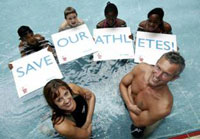Experts say athletes need better screening
Experts assert better screening of young athletes is needed, as their sudden death is often provoked by an enlarged heart.

Too often, heart problems that can cause an irregular heartbeat and sudden death are missed because there isn't enough uniform screening of athletes, said Dr. Lori Mosca, director of preventive cardiology at New York-Presbyterian Hospital.
Mosca spoke from an American Heart Association meeting in Florida where cardiologists have been talking about the weekend death of Ryan Shay. The 28-year-old runner was competing in New York in the men's marathon Olympic trials when he died suddenly on Saturday.
According to his father, Shay had an enlarged heart that was first diagnosed when he was 14. But whether that contributed to his death isn't known. Autopsy results are expected later.
"It's hard on all of us when something like this happens to a person who is doing all the right things as far as we can tell," said Mosca, a marathon runner herself. "We have to use this as an example to try to prevent future problems."
About 125 athletes under 35 involved in organized sports die of sudden death in the United States each year, said Dr. Barry J. Maron of the Minneapolis Heart Institute Foundation. The institute tracks such deaths in a national registry.
An analysis of 387 cases from the registry showed the vast majority were cardiac-related. About a quarter involved a condition called hypertrophic cardiomyopathy, which causes an enlarged heart. About 20 percent were from a blow to the chest, such as being hit by a bat or ball.
Maron said many of the cardiac diseases that can lead to sudden death can be spotted through screening.
"It's not perfect.

Maron helped write heart association guidelines that help doctors screen athletes for sudden death. The process includes questions that focus on spotting potential heart problems through a personal and family medical history and a physical exam.
An enlarged heart or thickened heart doesn't always preclude someone from participating in sports, Mosca said.
"There's a spectrum of what doctors might recommend," said Mosca.
While the inherited condition is mostly found in the young, other heart problems can cause sudden death in those over 35. Mosca said sedentary men over 40 and women over 50 should be screened before starting a vigorous exercise program.
"Even with an evaluation, there's no guarantee that you can prevent sudden death," she said. "What ultimately happens is a balancing of the risk of participating in sports against the benefits. That's true for everyone."
Elite athletes like Shay can have a larger than normal heart from strenuous exercise without causing any problem. While so-called "athlete's heart" thickens the heart muscle overall, hypertrophic cardiomyopathy creates thickening in one part of the heart and makes it harder to pump blood out to the body. One in 500 people have the disorder; some people have no symptoms.
"Sometimes it can be difficult to distinguish between these two conditions _ one being benign and one being potentially lethal," said Mosca.
Shay had had medical tests last spring in Flagstaff, Arizona, where he trained, and was cleared for running, according to his father, Joe Shay. He said his son hadn't complained of any problems.
Shay collapsed about 5Ѕ miles (8 kilometers) into the race Saturday in New York's Central Park. Ellen Borakove, spokeswoman for the city medical examiner's office, which did an autopsy, said doctors wanted to take a closer look at Shay's heart tissue before determining the cause of death.
Subscribe to Pravda.Ru Telegram channel, Facebook, RSS!


